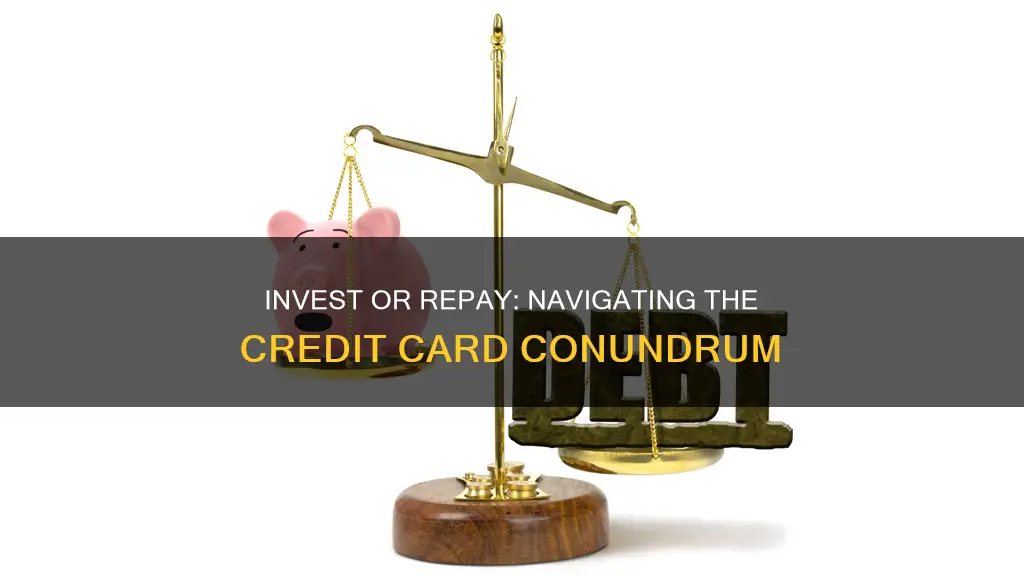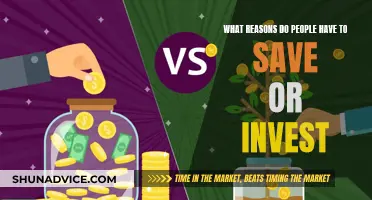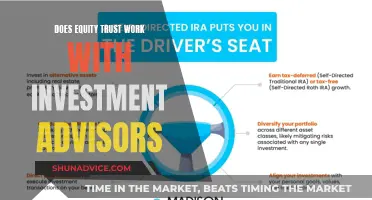
Whether to invest or pay off credit card debt is a common dilemma, and the answer depends on your financial situation and goals. Both options are worthy goals that can make sense depending on the circumstances.
If you have high-interest credit card debt, it's often best to prioritise paying that off first. Credit cards tend to have high-interest rates, and the interest compounds daily, so paying off this type of debt can be like getting a guaranteed return on your investment. On the other hand, investing in the stock market or other financial instruments can help you grow your wealth over time, but it comes with risks and typically lower returns than credit card interest rates.
Before deciding, it's essential to assess your financial situation and goals, create a budget, and consider factors such as tax benefits, interest rates, and your risk tolerance.
| Characteristics | Values |
|---|---|
| Interest rate on credit card debt | 24.37% as of April 2024 |
| Interest rate on investments | Varies, but stocks have returned an average of about 10.3% per year |
| Peace of mind | Paying off debt can reduce stress and improve your peace of mind |
| Credit score | Paying off credit card debt can improve your credit score |
| Emergency fund | It is recommended to have an emergency fund before investing |
| Retirement plan | Take advantage of a 401(k) contribution match from your employer before investing elsewhere |
| Risk tolerance | Consider your risk tolerance when deciding whether to invest or pay off debt |
What You'll Learn

The pros of paying off debt first
- Improved credit score: Paying off credit card debt improves your credit score, which is important if you want to buy a home or finance a vehicle. Credit utilization (the amount of credit you are using compared to the amount of credit you have available) accounts for a significant portion of your credit score.
- Save money on interest: The longer you hold credit card debt, the more interest you will pay. By paying off credit cards first, you prevent high interest charges from piling up over time.
- Improved peace of mind: Being able to escape credit card or loan payments can take a weight off your shoulders. Waiting to pay off debt means you carry that burden longer, and you rack up more interest charges.
- Reduced temptation to spend: Paying off a credit card and taking it out of your regular financial rotation will mean you are less likely to build up debt again.
- More money to invest: With no debt payments, you may have more money in your budget to save and invest.
- Better interest rates: Paying off debt improves your credit score, which can help you secure better interest rates in the future.
Public Utilities: Worth the Investment?
You may want to see also

The benefits of investing early
Investing early has many benefits, and it can be a great way to build wealth over time. Here are some advantages of starting your investment journey early:
Compound Interest:
Compound interest, often referred to as "the eighth wonder of the world" by Albert Einstein, is when your earnings generate interest on top of the initial interest. The longer your money is invested, the more it can grow due to compound interest. Starting early gives your investments more time to benefit from compound interest, potentially resulting in a larger nest egg for retirement.
Risk Tolerance:
When you start investing early, you have a higher risk tolerance because you have more time to recover from potential losses. This means you can explore more volatile investments that may offer higher returns. As you get older, it's advisable to shift towards more conservative investments to protect your capital.
Financial Freedom:
Investing early can lead to financial freedom and security. It provides the opportunity to build wealth, which can give you the flexibility to pursue your passions and make confident financial decisions, and reduce the risk of being stuck in a job you dislike.
Experience and Discipline:
Starting early in your investment journey allows you to gain valuable experience and discipline. You will have more time to learn from your successes and failures, make adjustments, and develop good financial habits. This experience will help you become a wiser investor and avoid common pitfalls.
Improved Quality of Life:
Investing early can improve your overall quality of life. It reduces the risk of being forced to make reckless choices to secure retirement, and it can provide a financial safety net in case of emergencies or unexpected expenses.
While investing early has numerous benefits, it's important to remember that investing carries risks, and past performance does not guarantee future results. It's essential to assess your financial situation, risk tolerance, and goals before making any investment decisions.
Buffett's Investing: Still Going Strong
You may want to see also

How to decide between the two
There are several factors to consider when deciding whether to invest or pay off credit card debt. Here are some key points to help you make an informed decision:
Assess Your Financial Situation
Start by creating a detailed budget to understand your income, expenses, and financial goals. Evaluate your monthly income, necessary expenses (such as rent, utilities, transportation, and groceries), discretionary spending, savings, and debt payments. This will help you determine how much money you can allocate towards paying off debt or investing.
Build an Emergency Fund
Before focusing solely on debt repayment or investing, it's crucial to have an emergency fund for unexpected expenses, such as car repairs, medical bills, or job loss. Aim to save at least $1,000 to $2,000 initially and gradually build it up to cover three to six months' worth of expenses. This will provide a financial buffer and reduce the likelihood of increasing your debt during difficult times.
Prioritize High-Interest Debt
Credit card debt often carries high-interest rates, which can be costly in the long run. Compare the interest rate on your credit card debt with the expected return on your investments. If the interest rate on your debt is higher than the expected return, it's generally more advantageous to prioritize paying off the credit card debt first. This will save you money on interest charges over time.
Take Advantage of Employer Retirement Plans
If your employer offers a retirement plan, such as a 401(k) or 403(b), and provides matching contributions, consider contributing enough to take full advantage of this benefit. This is essentially "free money" and can boost your savings rate significantly. However, don't neglect paying off high-interest credit card debt, as it can accumulate quickly.
Consider Your Risk Tolerance
Investing in the stock market or other investment vehicles offers the potential for higher returns but also carries greater risk. Assess your risk tolerance and comfort level with market volatility. If you are comfortable with the potential ups and downs of investing, it may be an option to consider. However, if the thought of market fluctuations keeps you up at night, paying off debt might be a more suitable choice for your peace of mind.
Weigh the Benefits of Compounding Interest
Starting to invest early allows your money to grow over time through the power of compounding interest. The earlier you begin, the more time your investments have to benefit from compound growth. However, if you delay investing due to debt repayment, you may miss out on this opportunity.
Don't Neglect Your Credit Score
Focusing solely on investing while neglecting credit card debt can negatively impact your credit score. High credit card balances and missed payments can lower your credit score, affecting your ability to borrow money in the future and potentially increasing your interest rates. Prioritize credit card debt repayment to maintain a healthy credit score.
In summary, both investing and paying off credit card debt are important financial goals. Assess your financial situation, create a budget, build an emergency fund, and prioritize high-interest debt repayment. Consider your risk tolerance, the benefits of compounding interest, and the impact on your credit score. Remember, it doesn't have to be an either-or decision; you can work towards both goals simultaneously by finding a balance between investing and debt repayment.
Retirement vs. Student Loans: Navigating Your Financial Journey
You may want to see also

When it's OK to invest with credit card debt
While it's generally recommended to pay off credit card debt before investing, there are a few exceptions when it may be more beneficial to invest first. Here are some scenarios where it could be okay to invest while carrying credit card debt:
Your employer matches retirement contributions:
If your employer offers a retirement plan, such as a 401(k), and provides matching contributions, it may be worth investing up to the matching amount before focusing on credit card debt. This essentially gives you a 100% return on those dollars, which is higher than the interest saved by paying off credit card debt.
You have a 0% introductory APR on your credit card:
If you have a promotional 0% annual percentage rate (APR) offer on your credit card, it may be advantageous to invest your money instead of paying off the card. During the promotional period, your credit card balance won't accrue interest, so you can potentially earn a higher return by investing. However, be mindful of the end date, as the balance will start accruing interest at the standard rate once the introductory period ends.
You can earn a higher return on investments than the interest on your credit card debt:
If you can find an investment opportunity that offers a guaranteed return higher than the interest rate on your credit card debt, it may make sense to invest first. For example, if you can earn a steady 15% return on an investment while your credit card debt has an interest rate of 10%, investing first could be the better option. However, this scenario is less common, as credit card interest rates are typically higher than potential investment returns.
You have a manageable debt load and a plan to pay it off:
If you have a relatively low credit card debt that you can handle, and you have a clear and disciplined plan to pay it off, it may be okay to allocate some of your funds towards investing. Ensure that you make at least the minimum payments on your credit card to avoid late fees and maintain a good credit score.
Remember, these scenarios are exceptions to the general rule of prioritising credit card debt repayment. Credit card debt often carries high-interest rates, which can accumulate quickly. Weigh your options carefully and consider seeking professional financial advice to make the most informed decision for your specific situation.
Why Invest in Entertainment?
You may want to see also

The tax benefits of investing
While paying off credit card debt is generally recommended before investing, there are certain tax benefits associated with carrying certain debts that may make investing a more attractive option.
One important consideration is the tax-deductible nature of certain types of debt, such as student loan interest and mortgage loan interest. These deductions can reduce your taxable income for the year, resulting in lower tax payments to the IRS. This can be a significant advantage, especially if you are in a high tax bracket.
Additionally, investing in stocks, mutual funds, or other investments may generate higher returns than the interest paid on your credit card debt, especially if the market is performing well. This could potentially outweigh the interest charges on your credit card debt. However, it is important to carefully weigh the risks and potential volatility of the market before making any investment decisions.
Furthermore, investing early and taking advantage of compounding interest can be a compelling reason to consider investing over debt repayment. Compounding interest is the interest earned on your initial investment, which then generates additional interest over time. The earlier you start investing, the more time your money has to grow. For example, investing $6,000 per year in a Roth IRA starting at age 25, assuming a 7% annual return, could result in a balance of $1.28 million by the time you turn 65.
Another factor to consider is your risk tolerance. If you are comfortable with the potential ups and downs of the market and have a long investment horizon, investing may be a more appealing option than solely focusing on debt repayment.
However, it is important to note that paying off high-interest credit card debt should still be a priority. Credit card interest rates can be extremely high, often exceeding 18%, and it is challenging to find investments that consistently generate returns to match those rates. Therefore, it is generally recommended to prioritize paying off credit card debt before allocating a more significant portion of your funds towards investing.
Oil Investing: Smart Move?
You may want to see also
Frequently asked questions
It depends on the interest rate on your credit card debt and your investment's expected return. If your credit card debt has a high-interest rate, it's best to pay it off first. If your investment has the potential to earn a higher return than the interest rate on your credit card debt, then investing may be a better option.
Paying off credit card debt can improve your credit score, reduce financial stress, and save you money on interest charges. It can also free up cash flow that can be used for investing or saving.
Yes, if you have an introductory 0% annual percentage rate (APR) offer on a credit card or if you can take advantage of an employer match on retirement contributions, investing might be a better option.







